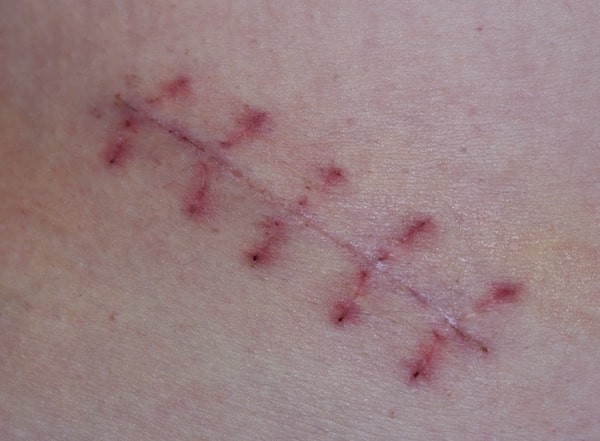Surgery scars can be reduced or prevented in a variety of ways. If you are planning on having surgery, it is a good idea to understand how to prevent or minimize your scarring. Of course, one of the first things to consider is good incision care. Taking care of your incisions post-procedure is the first step in minimizing long-term scarring.
Surgical Scar Causes
There is the possibility of scarring anytime the skin is damaged. Most of us have a few scars from childhood from skinned knees or elbows. No matter the skill of your surgeon, any surgery results in damage to the skin. A surgical incision causes damage through all of the layers of the skin and can result in scarring no matter where the incision is on the body or what type of surgery is performed. Of course, surgery performed by a less-skilled surgeon can result in greater scarring but, in most cases, the skill of the surgeon has little effect on the amount of long-term scarring. Any surgeon is unable to control all of the multitude of factors that determine your risk for long term scarring.

Scarring Risk Factors
Many of the risk factors for scarring are beyond your control. Your ability to heal without scarring depends on factors that cannot be changed. The information below can help you determine your likelihood of post-surgery scarring.
- Age – The skin becomes less elastic and thinner as we age. The fat layer under the skin thins out and collagen production slows down. When you combine these two facts with sun exposure and other environmental and lifestyle issues, older skin does not heal as quickly or as well as younger skin. There is a silver lining, though – sun damage and uneven tone to older skin can help to hide scars that would be more visible on younger skin.
- Race – Some skin tones are more likely to scar than others. Keloid scars and hypertrophic scars are much more common with African American patients. With both of these types of scars, there is an overgrowth of scar tissue at the site of an injury. With more fair-skinned races, scars are generally thinner and the color will stay near the color of the surrounding skin. These scars tend to be red or pink when they are new but they will fade with time. Patients with darker skin may experience scars that remain darker than the surrounding skin.
- Genetics – If your parents have the tendency to scar badly, you will most likely exhibit the same tendency. If you know that you have a family tendency toward scarring heavily, you may want to discuss this with your surgeon ahead of the procedure.
- Type of Incision – A larger incision is more likely to cause a lasting scar than a smaller incision. The width and the depth of the incision directly affects the length of the healing process and the opportunity for deep scars. Another thing to consider is that a longer incision in the skin may be exposed to more stress with body movements which can delay the healing process in many cases.
- Skin Healing – Some people are just lucky in that their skin heals quickly and easily with minimal to no lasting scarring. Others are not so lucky and their skin tends to heal more slowly. Sometimes this is due to underlying medical conditions. Having a disease like diabetes can cause your skin to heal more slowly. How quickly the skin heals varies from person to person and can change over time depending on illnesses or current medical conditions.
Scarring Prevention
Even with all of the factors listed above, it is possible to prevent scars by focusing on the factors that you can control. They include:
- Not Smoking – If you smoke, go ahead and stop as smoking increase the risk of scarring as well as slows down the healing process. Many plastic surgeons will not operate on patients that do not quit smoking for at least two weeks before surgery.
- Avoid Alcohol – The consumption of alcohol dehydrates your body which causes slower healing. While your incision is healing, you should avoid alcoholic beverages.
- Stay Hydrated – During the healing process, you should make sure your body is hydrated properly. Dehydration diminishes your overall health and healing can be impacted.
- Weight Management – Overweight patients are at greater risk of scarring. The fat deposits under the skin can work against the efforts of the doctor to close your incision seamlessly. Watch your weight as much as you can leading up to your procedure.
Scarring and Wound Care
One of the best ways to prevent scarring after surgery is to perform good, consistent incision care. Follow these guidelines:
- Get plenty of rest
- Perform incision care consistently
- Watch for signs of an infection
- Avoid excessive sun exposure
- Minimize stress on your incision
Treatments for Scars
There are available treatments for scar minimization that can be performed in the office of a doctor or at home. If you are concerned that you might not heal as well as you would like, consider discussing these treatment options with your surgeon. The doctor can likely recommend options such as silicone wound treatment or prescription medications to help the healing process.
